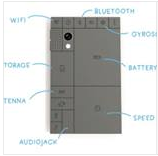Build-a-Phone

I mean obviously it is appealing, PCs are very similar to this in a respect. I personally would love it if this were the case. However, I can't see this happening for three reasons.
1) The phone OEMs (Samsung, HTC, RIM, Microsoft via Nokia, and most of all APPLE) will never let this happen in the way Dave Hakkens imagine it. This disintermediates them because component manufactures like Qualcom and others enter into very detailed and binding contracts with the above OEMs. Some of these contracts limit who the component manufactures do business with; exclusivity clauses if you will. Just like the iPhone was an AT&T exclusive for several years. If any of the major component manufactures indicate that they might bypass the OEMs and release one of their top of the line processors or sensors directly to customers in a form that is compatible with this lego style phone, the OEMs would retaliate. They would threaten to ditch them as suppliers. Since the OEMs have all of the marketing power and carrier deals this could be a death sentence for their main business. Which leads me to reason two.
2) The one component that makes or breaks this idea is the 3G/4G radio. A stand alone plug and play radio would have to get blessed by the carriers that it plans to connect to. Due to the lack of common carriage laws in the US there is no regulation that says any carrier has to allow a device on to there network. So since this will not only bypass the OEMs, but also the carrier's handset retail business (which is just as lucrative as their service business if not more so), no carrier will approve a modular radio to connect to its network.
The result of these first 2 will relegate these modular devices to wi-fi only handsets with medium to low quality parts from small component manufactures. This may find a place with niche consumers, but will never come close to replacing anyone's main smartphone. It would be a companion device at best and therefore likely never get made. Now you might see a form of this but only in a form that doesn't threaten any of the established players. I could see Samsung releasing a line of modules that will work together, the catch will only Samsung parts will work together. The component manufactures would still ship the raw components to the OEMs, and then they would add encase it in the swappable module. This would allow you to upgrade your Samsung branded processor with another Samsung branded processor. If you wanted to use parts from say HTC if they started doing the same thing, you'd have to start over and get all HTC parts thus defeating the purpose.
3) Getting past 1 and 2 are not impossible but will require significant regulation reform in the US to prevent these types of exclusivity contracts and require wireless carriers to act as common carriers with mandated connection requirements. When/if this happens it will be years from now, in addition to make all the modules work well together, someone (The FCC maybe?) would have to put out strict interoperability protocols and then enforce them. Each component would have to have it's own FCC filing which will increase the cost of going to market with new components. This is all possible, but the time to get it in place is staggering, and my prediction is if/when it is, smartphones will no longer be the main computing paradigm. These components are getting very small very fast, and wearables/implantables are right around the corner. So unless you want to assemble the component modules of your smart contact lens with a microscope, the smartphone is likely the last chance for modular computing in the macro sense and due to the lack of regulation on US capitalism it will never reach its full potential.